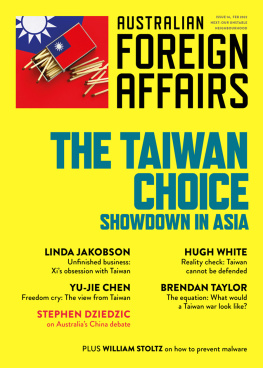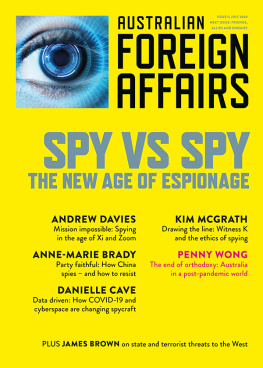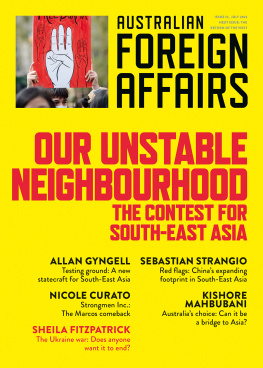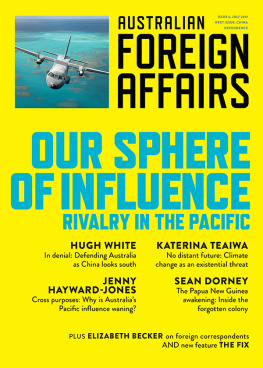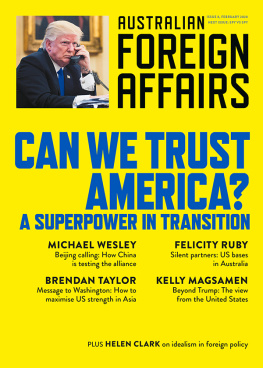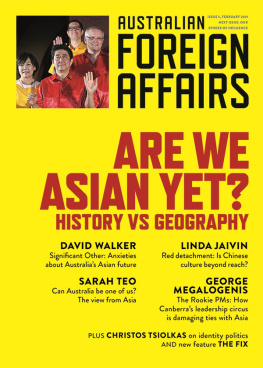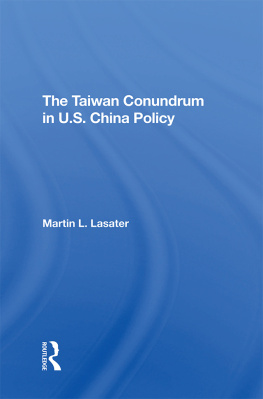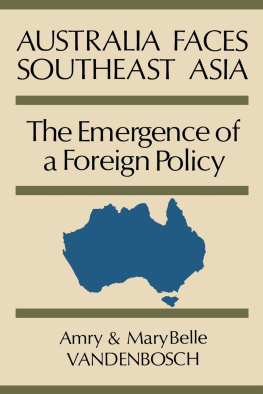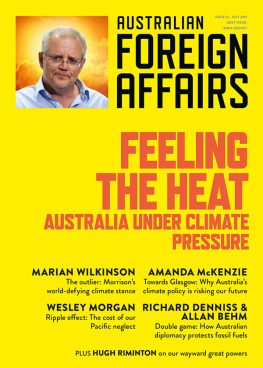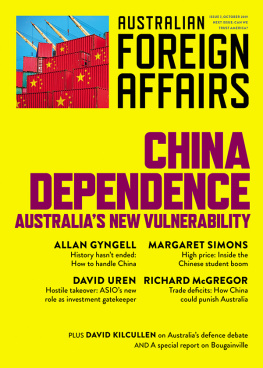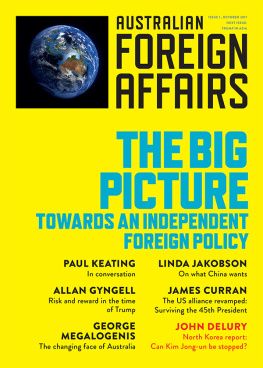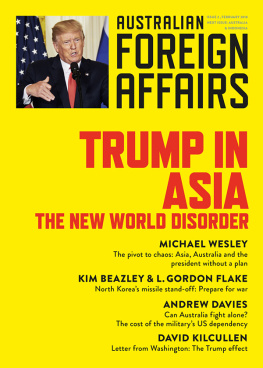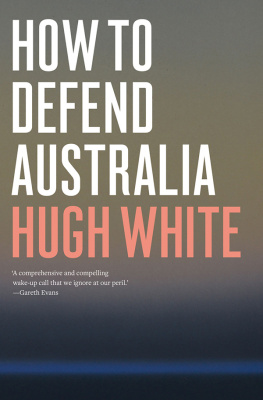ISSUE 14, FEBRUARY 2022
AUSTRALIAN FOREIGN AFFAIRS
Australian Foreign Affairs is published three times a year by Schwartz Books Pty Ltd. Publisher: Morry Schwartz. ISBN 978-1-74382-2166 ISSN 2208- 5912 ALL RIGHTS RESERVED. No part of this publication may be reproduced, stored in a retrieval system, or transmitted in any form by any means, electronic, mechanical, photocopying, recording or otherwise, without the prior consent of the publishers. Essays, reviews and correspondence retained by the authors. Subscriptions 1 year print & digital auto- renew (3 issues): $49.99 within Australia incl. GST. 1 year print and digital subscription (3 issues): $59.99 within Australia incl. GST. 2 year print & digital (6 issues): $114.99 within Australia incl. GST. 1 year digital only auto- renew: $29.99. Payment may be made by MasterCard, Visa or Amex, or by cheque made out to Schwartz Books Pty Ltd. Payment includes postage and handling. To subscribe, fill out the form inside this issue, subscribe online at www.australianforeignaffairs.com, email subscribe@australianforeignaffairs.com or phone 1800 077 514 / 61 3 9486 0288. Correspondence should be addressed to: The Editor, Australian Foreign Affairs, 2224 Northumberland Street, Collingwood, VIC, 3066 Australia Phone: 61 3 9486 0288 / Fax: 61 3 9486 0244 Email: enquiries@australianforeignaffairs.com Editor: Jonathan Pearlman. Deputy Editor: Kirstie Innes-Will. Associate Editor: Chris Feik. Consulting Editor: Allan Gyngell. Digital Editor and Marketing: Georgia Mill. Management: Elisabeth Young. Subscriptions: Iryna Byelyayeva and Sam Perazzo. Publicity: Anna Lensky. Design: Peter Long. Production Coordination: Marilyn de Castro. Typesetting: Tristan Main. Cover photograph: Mykhailo Polenok / Alamy Stock Photo.
Contributors
Yu-Jie Chen is an assistant research professor at Academia Sinica and an affiliated scholar at the USAsia Law Institute of NYU.
Stephen Dziedzic is the ABCs Foreign Affairs (Asia Pacific) reporter.
Linda Jakobson founded China Matters, a public policy initiative.
Lynne ODonnell was bureau chief for Associated Press and AFP in Afghanistan between 2009 and 2017.
William A. Stoltz is Senior Adviser for Public Policy at the National Security College at the Australian National University.
Cait Storr is Chancellors Postdoctoral Research Fellow in law at the University of Technology, Sydney.
Brendan Taylor is a professor of strategic studies at the Australian National University.
Andrew Wear is a policy expert and author.
Hugh White is an emeritus professor of strategic studies at the Australian National University.
Editors Note
THE TAIWAN CHOICE
For decades, Australias approach to Taiwan has been based on a convenient diplomatic contortion. Australia does not recognise Taiwan as a state, but also does not explicitly say it is part of China; nor, until late 2021, did Australia signal whether it was committed to defending Taiwan from invasion.
Australias awkward Taiwan policy is prone to being misinterpreted and to eliciting gaffes from leaders who try to explain it. Last May, for instance, Australian prime minister Scott Morrison was asked in a morning radio interview about his position on Taiwans calls for countries to support it against Chinese president Xi Jinpings expansionism.
I dont wish to add to any uncertainty, Morrison said, before confusingly and incorrectly saying Australia supported the one country, two systems formula a policy originally designed by Beijing to persuade Taiwan to integrate. But Morrison was not suddenly adopting a new pro-China approach; most likely, he confused Australias one country position on Hong Kong with its one China policy on Taiwan. The mistake highlighted the difficulty of presenting a straightforward account of a policy that strives for ambiguity.
Australias current policy is designed to preserve the political status quo in which a thriving Taiwan is free of Chinas control and to ensure that Canberra does not need to formally commit to militarily protect Taiwan.
The most significant example of Australias struggle to uphold its Taiwan ambiguity occurred in 2004, when, during a visit to Beijing, the foreign minister, Alexander Downer said that the ANZUS Treaty would not require Australia to automatically support the United States in a war over Taiwan. Asked to clarify Downers comments, Australian prime minister John Howard said there was no need to get into a political science lecture or to confirm Australias commitments in the event of such a war. The issue of conflict between China and the United States is hypothetical, he said. Our policy is to be friendly with both.
But the difficulty for Australia is that the prospect of war is no longer so hypothetical. Xi has pledged to achieve reunification with Taiwan and is equipping the Chinese military for a potential takeover; Taiwan says it will resist; and Washington is backing Taiwan. It cannot be said that Australia, which has been subject to trade sanctions and a diplomatic freeze by China, is still friendly with both.
Some Australian politicians have begun calling for Canberra to dispense with the ambiguity and explicitly commit to defending Taiwan. Notably, Defence Minister Peter Dutton declared in November 2021 that Australia would inevitably back the US in a war over Taiwan, saying there is no sense sticking your head in the sand.
Morrison did not repeat Duttons comments, but insisted he supported them. This is not a time where Australia can afford people having an each-way bet on national security, Morrison said. It was an odd way to present a change to one of Australias most important foreign policies.
If Australia is going to dispense with its each-way bet on Taiwan, it needs to grasp the risks and ramifications. A war would reshape Asia it would determine the future role of the US in the region, and it would shake the foundations of the US alliance, which has been the bedrock of Australian security since World War II.
As tensions rise in the Taiwan Strait, Australias position of ambiguity is becoming harder to preserve or explain. As Australia weighs its choices, it must understand the prospects of a war, the likely outcome and the potential consequences for China, the US, the Asia-Pacific region, and Taiwan.
Jonathan Pearlman
REALITY CHECK
Taiwan cannot be defended
Hugh White
It is not inevitable that America and China will go to war over Taiwan, but the risk is real, and growing. If it comes, this war would be unlike anything we have seen for seventy-five years, and quite possibly unlike any war ever seen before. It would be the first conflict between major world powers since 1950, when China and America fought in Korea. It would also be the first serious war between nuclear-armed powers. Until now, there have only been minor border clashes between nuclear adversaries Pakistan and India, India and China, and China and the Soviets. A war over Taiwan would be nothing like these. We must expect that once fighting began, it would swiftly escalate into a full-scale regional conflict, and nuclear war would then become hard to avoid. The consequences for America, for China, for the people of Taiwan and for everyone else in Asia and beyond would be immense, and disastrous. And yet no one seems to be seriously trying to reduce the risk of this war happening.
In fact, America and China, the key players, both seem content to allow the tensions around Taiwan to build. Neither side wants to go to war, but both sides think that the possibility of a clash will serve their wider strategic aims. Washington hopes that the threat of war will deter China from challenging Americas primacy in East Asia, and Beijing hopes that it will deter America from trying to contain Chinas ambitions. It is a very dangerous game.
Next page
